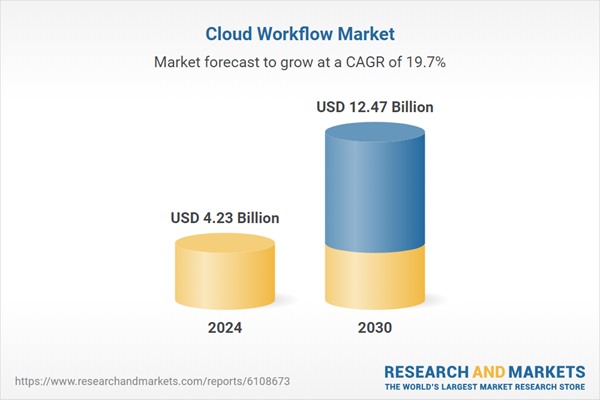Speak directly to the analyst to clarify any post sales queries you may have.
10% Free customizationThis report comes with 10% free customization, enabling you to add data that meets your specific business needs.
As businesses increasingly move away from legacy systems, demand is rising for cloud workflows that support agility, faster execution, and better data management. Industries such as healthcare, retail, manufacturing, and banking are adopting these tools to boost productivity and compliance while accelerating decision-making. The rise of remote and hybrid work models further amplifies the need for adaptive, cloud-native automation. Moreover, integration of AI and ML is making cloud workflows more intelligent and responsive to dynamic operational demands.
Key Market Drivers
Demand for Operational Efficiency and Cost Reduction
Organizations are increasingly leveraging cloud workflow solutions to automate repetitive processes and cut operational expenses in an environment marked by rising costs and pressure to improve efficiency. By streamlining functions such as payroll processing, approvals, and service requests, these platforms free up employees to focus on strategic initiatives.They also enhance visibility into workflows, offering analytics and actionable insights for data-driven decision-making. Cloud workflows reduce the need for physical infrastructure, helping businesses save on hardware and maintenance expenses. This transition enables cost savings of up to 45%, driven by reduced redundancy, fewer manual errors, and optimized resource use. As a result, companies can reallocate budgets to innovation, customer engagement, and market growth, positioning themselves for sustainable development in a competitive landscape.
Key Market Challenges
Data Security and Compliance Complexities in Multi-Cloud Environments
As organizations adopt cloud workflow solutions across hybrid and multi-cloud environments, ensuring data security and compliance becomes increasingly challenging. Sensitive business data is now distributed across various platforms, often with inconsistent encryption practices, access controls, and residency protocols. This fragmentation makes it difficult to enforce uniform policies, raising the risk of breaches and non-compliance. Global and regional regulations, such as the GDPR in Europe and CCPA in the U.S., further complicate matters with stringent and varying data protection mandates. Enterprises must navigate overlapping regulatory requirements to avoid legal penalties, reputational damage, and operational disruptions - making robust compliance frameworks and security strategies critical for cloud workflow adoption.Key Market Trends
Rising Adoption of Low-Code and No-Code Platforms in Workflow Automation
An important trend shaping the Cloud Workflow Market is the increasing use of low-code and no-code platforms that enable rapid development of workflow solutions without advanced programming knowledge. These platforms offer user-friendly interfaces, prebuilt templates, and drag-and-drop tools, allowing business users to design and deploy automated workflows independently. This reduces reliance on IT teams, accelerates development cycles, and fosters innovation across departments. By enabling quick customization and deployment, low-code/no-code solutions support organizational agility and enhance responsiveness to evolving business needs - driving broader adoption of cloud-based workflow automation across various industries.Key Market Players
- Infosys Limited
- HCL Technologies Limited
- TIBCO Software Inc.
- Salesforce, Inc.
- Zoho Corporation Pvt. Ltd.
- IBM Corporation
- Microsoft Corporation
- SAP SE
Report Scope:
In this report, the Global Cloud Workflow Market has been segmented into the following categories, in addition to the industry trends which have also been detailed below:Cloud Workflow Market, By Type:
- Platform
- Services
Cloud Workflow Market, By Application:
- Human Resource
- Sales and Marketing
- Accounting and Finance
- Customer Support
- Procurement and Supply Chain
- Operations
- Others
Cloud Workflow Market, By Organization Size:
- Large Enterprise
- SMEs
Cloud Workflow Market, By End Use:
- BFSI
- IT & Telecom
- Government
- Retail & Ecommerce
- Others
Cloud Workflow Market, By Region:
- North America
- United States
- Canada
- Mexico
- Europe
- Germany
- France
- United Kingdom
- Italy
- Spain
- Asia Pacific
- China
- India
- Japan
- South Korea
- Australia
- Middle East & Africa
- Saudi Arabia
- UAE
- South Africa
- South America
- Brazil
- Colombia
- Argentina
Competitive Landscape
Company Profiles: Detailed analysis of the major companies present in the Global Cloud Workflow Market.Available Customizations:
With the given market data, the publisher offers customizations according to a company's specific needs. The following customization options are available for the report.Company Information
- Detailed analysis and profiling of additional market players (up to five).
This product will be delivered within 1-3 business days.
Table of Contents
Companies Mentioned
- Infosys Limited
- HCL Technologies Limited
- TIBCO Software Inc.
- Salesforce, Inc.
- Zoho Corporation Pvt. Ltd.
- IBM Corporation
- Microsoft Corporation
- SAP SE
Table Information
| Report Attribute | Details |
|---|---|
| No. of Pages | 185 |
| Published | July 2025 |
| Forecast Period | 2024 - 2030 |
| Estimated Market Value ( USD | $ 4.23 Billion |
| Forecasted Market Value ( USD | $ 12.47 Billion |
| Compound Annual Growth Rate | 19.7% |
| Regions Covered | Global |
| No. of Companies Mentioned | 8 |









